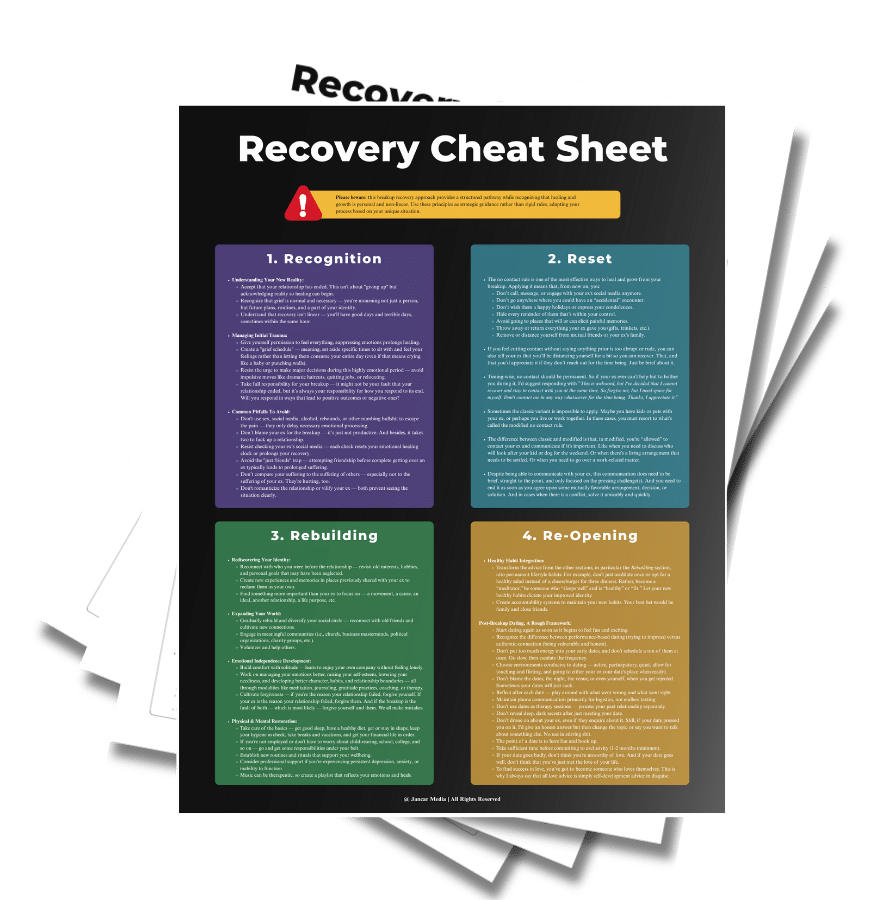Click play to listen to this article.
It’s no secret that breakups are taxing. There are many psychological foes they bring to the table: depression, bruised ego and degraded self-esteem and self-worth, and broken boundaries, just to name a few.
These are all real consequences, but fortunately, they are manageable and treatable. You can always go to therapy and jump into various self-help activities to mend your depression, rebuild your self-esteem, begin accumulating a healthier sense of self-worth and learn how to set and keep sturdy boundaries.
However, certain consequences are not as easily treatable. These are our errors in reasoning, also termed logical fallacies. At best, they’re harmless but misleading. At worst, they lead us to develop self-sabotaging beliefs about relationships, which hamper breakup recovery and even prevent us from finding new love. This article aims to shine a light on five that I consider most destructive and toxic.
A guide to breakup recovery based on embracing discomfort, extracting wisdom from dark moments, and healing through evidence-based practices.
Order Your Copy1. The Fallacy Of Composition
The Fallacy Of Composition arises when one infers that something is true of the whole from the fact that it is true of some part of the whole. Put differently, it arises when someone mistakenly concludes that something that is true for an individual must also be true for the group to which that individual belongs. (1)
Here’s a typical example: “my ex-girlfriend cheated on me. My next partner is also probably going to cheat. Hell, all women are cheaters. Fuck relationships. Fuck women. I’ll just stay single.”
Notice how the example infers that all women are cheaters just because the person in question got cheated on? This abrupt jump to an invalid conclusion is the Composition Fallacy in action.
Here are a few more examples:
- My stoner ex-boyfriend only wore Supreme branded, oversized, and baggy clothing. Therefore, all men who wear Supreme branded, oversized and baggy clothing are low-life stoners that I should stay away from.
- My ex-girlfriend loved it when I hit her ass while having sex. Therefore all women like to be spanked while having sex.
- My ex-boyfriend constantly played video games and gave me little to no attention because of them. Therefore, all men who play video games are neglecting partners.
2. The Fallacy Of Division
The Fallacy Of Division is the opposite of the Fallacy Of Composition. It acts up as soon as you take one global group trait and assume it must be true for every individual inside (or sometimes even outside) that group. (2)
For instance: “Ninja Turtles fans love pizza. Billie is a fan, and she watches Ninja Turtles daily. Therefore, Billie loves pizza.”
But here’s the reality: even though numerous Ninja Turtles fans love pizza, primarily due to Michelangelo’s ecstatic influence, not all of them do. Some prefer hamburgers. Others anchovies.
Here are a few more examples:
- Men prefer thin and athletic women with big breasts. So every man must have the same desires for their perfect partner or playmate.
- Women prefer ambitious and masculine men. Therefore all women will only date and become exclusive with ambitious and masculine men.
- Women get over their ex’s faster than men. Therefore, all women get over their ex’s faster than men.
- Handling breakup pain is easier for women than it is for men. Therefore, all women have it easier when handling breakup pain.
An online interactive video course that teaches you how to get past a breakup so you can create a new possibility for love (with your ex or someone new).
Get Instant Access3. The Bandwagon Fallacy
The Bandwagon Fallacy transpires when you believe something is real or acceptable only because it’s widely believed in or popular. (3)
For instance, Tristan just got cheated on and then dumped by his girlfriend. Most of Tristan’s guy-friends also got cheated on by their partners, so they developed a global belief that all women are cheaters — they all succumbed to the Fallacy Of Composition I mentioned earlier.
Naturally, Tristan talked to his friends about his betrayal one day, compared his partner with theirs, and in the end, adopted the same belief they had — all women cheat.
And since his mindset was, “If all my betrayed friends say women are cheaters, then it must be true,” the tendency to genuinely believe that seemed reasonable. So he jumped on the same bandwagon his friends were on; the Bandwagon Fallacy (pun intended).
4. The Appeal To Nature Fallacy
The Appeal To Nature Fallacy goes like this: if something is natural, it must be good. But, if something is unnatural, it must be wrong/bad.
Here are some common examples:
- Women are naturally better caregivers. Therefore, it’s good if they look after children.
- Women should be caretakers. Therefore, a woman pursuing her career instead of taking care of her home and man is a bad person.
- Men are naturally dominant. Therefore, it’s good or healthy if they dominate their partners and others.
- Men are less emotional, on average. Therefore, it’s healthy if they stay that way and avoid practicing vulnerability.
This fallacy often makes us view the opposite gender or just about any potential partner in a skewed, fucked up way, which considerably limits our dating options. Because when you believe all men/women are XYZ, you’ll create a sort of unconscious filtering system in your mind that will make you attract only the people who conform to your conclusions and views. (4)
5. The Naturalistic Fallacy
Think of The Naturalistic Fallacy as a subset of The Appeal To Nature Fallacy. Here’s how it goes: if something is natural, it must be moral (morally right). If something is unnatural, it must be immoral (morally wrong). (6)
Let’s look at some examples:
- Women are naturally better caregivers. Therefore, they should look after the children.
- Women are naturally good caretakers. Therefore, they shouldn’t be pursuing a big career.
- Men are naturally dominant. Therefore, they should dominate their partners.
- Men are less emotional, on average. Therefore, they shouldn’t bother practicing vulnerability.
While the Appeal To Nature Fallacy makes a general claim of goodness/healthiness, the Naturalistic Fallacy makes a moralistic value claim. You can also deduce from previous examples that people often intertwine and use these two last fallacies in gender roles and sexuality discussions.
Final Thoughts
We all have these fallacies. And their intensity is always proportional to the intensity of our breakup. The more traumatic it is, the more certain we are that our fallacies are truth. And while you can’t get rid of them, you can learn to manage them better. The way you do this comes down to acknowledgment and self-awareness.
First, you must consistently and consciously acknowledge what these fallacies really are: not facts but mere rationalizations and over-simplifications. Then, you must get good at noticing those fallacies so you can act against them when they appear and avoid cultivating any sort of delusional worldviews based on them.
This cheat sheet lays out 40+ solutions to overcoming a breakup so you can create a new opportunity for love — be that with your ex or someone completely different.
Get The Free Cheat Sheet


